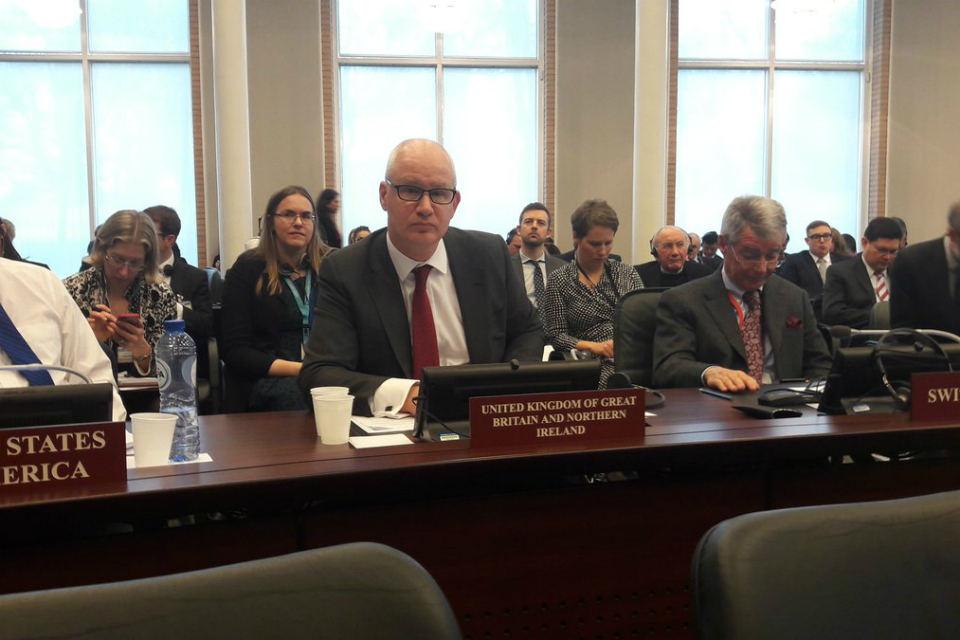Organisation for the Prohibition of Chemical Weapons 87th Executive Council session: statement on the Salisbury incident
Statement by Peter Wilson, Permanent Representative of the UK to the Organisation for the Prohibition of Chemical Weapons, on the use of a nerve agent in the UK.

Mr Chair, Director General,
The statement that I deliver this morning is markedly different from our usual statements to the Executive Council. I did not expect to have to brief this Council on the first offensive use of a nerve agent of any sort on European territory since World War II.
On 8 March, the United Kingdom Delegation informed the OPCW Technical Secretariat that 2 people, Sergey and Yulia Skripal, had been taken seriously ill on 4 March in the city of Salisbury following exposure to a nerve agent. The police were treating it as attempted murder, and were investigating the case thoroughly. A UK police officer, one of the first responders, also fell seriously ill. We committed to update the Technical Secretariat and the OPCW Executive Council when more information became available.
My Prime Minister made a statement yesterday evening to the United Kingdom’s Parliament. She said our analysis had confirmed that the substance used was a military-grade nerve agent of a type developed by Russia, part of a group of agents known as ‘Novichok’ agents. My Prime Minister set out the United Kingdom’s conclusion that it is highly likely that Russia was responsible for this attack.
This conclusion is based on a number of strands of evidence, including:
- the positive identification of the chemical agent by experts at the United Kingdom’s Defence Science and Technology Laboratory at Porton Down
- our knowledge that Russia has previously produced this agent and would still be capable of doing so
- Russia’s record of conducting state-sponsored assassinations; and
- our assessment that Russia views at least some defectors as legitimate targets for assassination
We can see only 2 plausible explanations for the use of such a chemical nerve agent: it was either a direct act by the Russian state against the United Kingdom, or a case where the Russian government had lost control of this potentially catastrophically damaging nerve agent and allowed it to get into the hands of others.
On 12 March, my Foreign Secretary summoned Russia’s Ambassador to the United Kingdom, and asked him to explain how this Russian-produced nerve agent could have been deployed in Salisbury against Mr Skripal and his daughter. He asked Russia to provide immediate, full and complete disclosure of the Novichok programme to the OPCW. And he asked for Russia to respond within 24 hours – in other words, by the end of today.
My Foreign Secretary spoke to the Director General yesterday to update him on the situation. He also thanked the Director General and the OPCW Technical Secretariat for their offer of technical assistance.
Mr Chair, States Parties to the Convention take on a duty to uphold and enforce its fundamental tenets. We commit not to develop, produce, otherwise acquire, stockpile or retain chemical weapons. We commit not to transfer, directly or indirectly, chemical weapons to anyone. We commit never to use chemical weapons. We commit not to engage in any military preparations to use chemical weapons. And we commit not to assist, encourage or induce anyone to engage in prohibited activity.
The stark conclusion is that it is highly likely that Russia, a fellow State Party to the Chemical Weapons Convention and fellow member of this Executive Council is implicated in chemical weapons use, whether by failure to control its own materials or by design. And in whichever scenario, Russia has failed, for many years, to declare chemical weapons development programmes dating from the 1970s.
This attempted murder, using a weapons-grade nerve agent in a British city, was not just a crime against the Skripals. It was an indiscriminate and reckless act against the United Kingdom, which put the lives of innocent civilians at risk. This incident has demanded a large scale response from our first responders in the police and medical services, with substantial assistance from our military specialists. The United Kingdom is fortunate enough to have extensive, dedicated and robust capabilities to respond to such an event. Not every country has this. That is why building capacity for effective national implementation of the Convention is so important. We have supported and invested in technical assistance programmes, including through the OPCW, to build capabilities globally to respond to cases of alleged or actual chemical weapons use.
All of us in this room should be aware: if the norm against chemical weapons use continues to be eroded, if we don’t stand up to enforce the fundamental tenets of the Convention, what has happened in the United Kingdom could happen in any one of our countries. Indeed, in the last 13 months alone, chemical weapons attacks have taken place in Syria, in Iraq, in Malaysia and now in the United Kingdom.
Those who have used chemical weapons cannot be immune from the consequences of their actions. We must all do all that we can to bring perpetrators of chemical weapons attacks to justice, whoever they are, and wherever they may be. The United Kingdom was proud to join the International Partnership Against Impunity for the Use of Chemical Weapons. We encourage all States Parties to join it to demonstrate their own commitment to end use of chemical weapons once and for all, to stand together against chemical weapons use, and to take action to hold perpetrators accountable.
Mr Chair, we will keep the Technical Secretariat and this Council informed of developments as soon as our legal processes allow. With your permission, Mr Chair, I will return to this issue later in this Council Session if there are any further updates.
Find out more about the UK government response to the Salisbury attack.